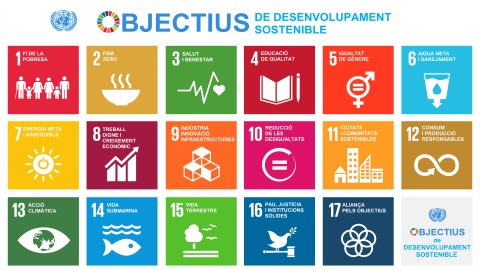Sustainable Development Goals included in UAB bachelor's degrees

05/04/2017
Until now, this training was focused on generating critical awareness and constructing a global citizenship, and was normally not included in formal academic training, as described in the report the Fundació Autònoma Solidaria presented in collaboration with ACUP: (http://www.uab.cat/doc/diagnosiEpDuniversitats).
The Fundació Autònoma Solidaria (FAS) offers this initiative focused on the introduction of sustainable development goals (SDG) into the UAB bachelor's degrees with the objective of helping students become aware of the influence they can have in their professional future and thus contribute to helping them learn the specific skills belonging to the field of Education for Development (EFD).
The initiative will be included in five bachelor's degrees: Education Studies, Primary Education, Social Education, Computer Engineering and Aeronautics. It will also be implemented in other faculties in the coming years, given that these contents represent a good opportunity to strengthen the university's role as a global citizenship shaper.
A study conducted by the UAB-FAS in collaboration with the Catalan Association of Public Universities (ACUP), detected the need to offer a more critical and socially committed education in its universities' undergraduate degrees. The study, which analysed study plans in eight universities and surveyed 892 undergraduate students at the UAB, concluded that this training was not included in formal education scenarios and that there was no link between this type of training and the content of the study plans. In addition, the results of the study revealed that subjects which included Education for Development were basically optional and including the contents was ultimately a decision taken by each lecturer. The study can be consulted (in Catalan) at http://www.uab.cat/doc/diagnosiEpDuniversitats
The Sustainable Development Goals (SDG) are 17 global goals and 169 specific targets to reach these goals, which were created by the United Nations and are valid from 2015 to 2030. The aspects included range from economic growth and social inclusion to environmental protection. They are aimed at generating critical awareness of our global reality and providing tools for participation and social transformation in terms of justice and solidarity. They are based on the principle of guaranteeing a dignified life for all humans, with respect for fundamental rights, and understanding environmental protection as a key element.
The introduction of SDGs into the UAB's bachelor's degrees is a way to "institutionalise" the inclusion of education for development in the contents of the study plans.
The UAB's training proposal will consist in workshops and activities designed collaboratively by the lecturers offering related subjects. A total of 17 workshops will be offered in the first and third years, corresponding to five bachelor's degrees in which some 650 students participate. The workshops will serve to raise awareness of the 2030 Agenda, the Sustainable Development Goals included in the agenda and the main problems which need solving (extreme poverty, hunger, access to health care and education, climate change, etc.), with the aim of producing a critical reflection on the structural dynamics of inequality and the need to advance towards sustainable development models from three different perspectives (economically, socially and environmentally).
“Issues focused on the scientific area of each discipline and the most closely related SDGs are debated and at the same time students are asked to come up with specific proposals from that discipline which could represent an overall improvement for the SDG. The aim is to bring on a series of reflections among students on their role regarding social commitments as students, future professionals and citizens", explains lecturer Sílvia Puente, in charge of some of the workshops offered at the School of Engineering and the Faculty of Education.
The methodology applied is participative, combined with the identification of students' previous knowledge, the explanation of the SDGs and a final project which can take the form of a debate or assignment to be done in small groups, depending on the degree. As a complementary action, activities are prepared with each faculty to allow studying in depth the sustainable development problems and challenges most closely related to each area of knowledge.
This proposal forms part of the ESDU project (Education for Sustainable Development at University), coordinated by the FAS and the UAB and with support from the Barcelona City Council, which aims to promote the curricular integration of a transformative education into formal academic training and thus strengthen the role of the university as an agent of social change.
This initiative reinforces other lines of work begun by the Faculty of Education and the School of Engineering which are also aimed at strengthening skills related to critical thinking, ethical commitment and sustainable development, such as the organisation of courses for lecturer and encouraging students to create and work on EFD projects.